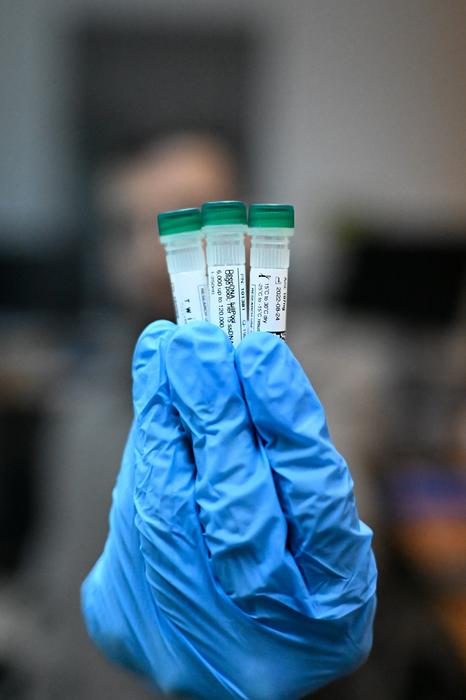Researchers at the Technion-Israel Institute of Technology are making waves in the field of data storage by developing a breakthrough method for DNA-based data retrieval. This innovative approach harnesses artificial intelligence to significantly speed up the process of accessing data stored in DNA, achieving retrieval times that are three orders of magnitude faster than current technologies. The research team, comprised of Ph.D. student Omer Sabary and esteemed faculty members Dr. Daniella Bar-Lev, Dr. Itai Orr, Prof. Eitan Yaakobi, and Prof. Tuvi Etzion, has crafted a solution that not only enhances speed but also improves accuracy, setting a new standard in this emerging field.
DNA data storage stands out as a viable alternative to traditional digital media, such as magnetic disks and flash drives, due to its extraordinary attributes. DNA, the building block of life, holds immense potential as a storage medium because of its remarkable durability, energy efficiency, and data density. Remarkably, DNA has been shown to preserve information for hundreds of thousands of years, with studies indicating that viable DNA was extracted from specimens dating back 700,000 years. In stark contrast, conventional magnetic disks typically last only a couple of decades at best, underscoring DNA’s promise for long-term data preservation.
The growing global demand for data storage has rendered current technologies unsustainable. Presently, data centers consume approximately three percent of global electricity while emitting around two percent of total carbon emissions. Amidst escalating environmental awareness, DNA offers a greener alternative by addressing energy consumption challenges. The density of DNA as a data storage medium is unparalleled, boasting capabilities to store information at scales up to 100 million times greater than traditional storage methods. Such efficiency implies that a mere one-megabyte volume could potentially house around 100 terabytes of data encoded in DNA, revolutionizing how information is stored and accessed.
However, the road to viable DNA-based storage solutions is fraught with challenges. Writing and reading data from DNA involves processes that are, currently, lengthy and prone to errors. Synthesis creates numerous copies of DNA molecules that represent stored data, but these copies may become disordered in the process of storage. During retrieval, sequencing often yields erroneous results, with many sequences containing errors that compromise data integrity. Consequently, researchers have been tasked with finding robust computational methods that could streamline retrieval processes while also ensuring data accuracy.
The team’s novel solution, named DNAformer, is a transformative method that leverages deep learning and advanced mathematical techniques to facilitate data retrieval from complex DNA storage environments. The DNAformer utilizes a transformer model, which has been meticulously trained with simulated data to reconstruct accurate DNA sequences from the chaotic pool of erroneous copies. This not only expedites data retrieval but also ensures heightened correctness by applying a custom error-correction code specifically designed for DNA.
In an impressive demonstration of efficiency, DNAformer reduces the reading time of 100 megabytes of data to just 10 minutes—a remarkable feat that offers a staggering 3,200 times improvement compared to existing methods. Despite achieving this quantum leap in speed, DNAformer retains superb accuracy, proving its efficacy in practical applications. The method’s capabilities were showcased using a versatile 3.1-megabyte dataset, which included diverse data formats such as images, audio clips, and written text.
Further underscoring the method’s versatility, the dataset even encompassed random data meant to illustrate its applicability to encrypted or compressed files, hinting at potential future uses in various sectors. The researchers express confidence in the scalability of DNAformer technology, allowing its use in various applications and for larger data storage requirements. This adaptability is crucial in the face of growing demands for advanced data storage solutions in both commercial and scientific contexts.
Technological advances and infrastructure enhancements in DNA synthesis and sequencing are likely to provide fertile ground for applications of DNAformer. The researchers envision creating tailored versions of their method to meet different industry demands, ensuring that DNA storage can efficiently scale to accommodate the expected exponential growth of data generated by businesses, scientists, and consumers alike.
The development process has not occurred in isolation; it has benefitted from generous support through various grants from prestigious institutions. The research was made possible through backing from the European Research Council, the European Innovation Council, and the Israel Science Foundation, which collectively aim to inspire and fund groundbreaking scientific advancements.
Overall, the potential ramifications of this research are immense, capable of reshaping the landscape of data storage for generations. As industries transition toward increasingly efficient, reliable, and environmentally sustainable solutions, the promise of DNA data storage—tied together with advanced AI methodologies—offers a thrilling glimpse of the future of information management.
In conclusion, the pioneering work conducted by the Technion academic teams demonstrates that the intersection of biology and technology holds remarkable opportunities for improving how we store and access data. By addressing existing limitations and redefining protocols, they not only enhance the potential for DNA-based storage solutions but lay the groundwork for future innovations that could transform data management across multiple domains.
Subject of Research: DNA-based data storage and retrieval
Article Title: Scalable and robust DNA-based storage via coding theory and deep learning
News Publication Date: 21-Feb-2025
Web References: 10.1038/s42256-025-01003-z
References: European Research Council (ERC Grant, DNAStorage), European Innovation Council (EIC Grant, Project DiDAX), Israel Science Foundation (ISF)
Image Credits: Rami Shlush
Keywords
DNA information storage, AI-based retrieval, data density, long-term preservation, energy efficiency.




